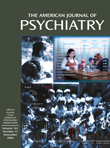A Longitudinal Study of Hippocampal Volume, Cortisol Levels, and Cognition in Older Depressed Subjects
Abstract
OBJECTIVE: This study determined whether cognitive impairments and structural brain changes in older depressed subjects, especially in the hippocampus, are related to hypercortisolemia. METHOD: Sixty-one depressed subjects over age 60 who met DSM-IV criteria for major depression and 40 healthy comparison subjects underwent structural magnetic resonance imaging, neuropsychological testing, apolipoprotein E (APOE) genotyping, and salivary cortisol assessment (over 3 days) with follow-up 6 months later. Hippocampal volume was measured by manual segmentation that was blind to diagnosis. Average area under the curve for salivary cortisol over the 3 days was calculated. Cognitive function was assessed by using a combined memory z score. RESULTS: Depressed subjects showed multiple impairments in attention, working memory, visual memory, verbal memory, new learning, and executive function in relation to comparison subjects. They had hypercortisolemia (53% increase in area under the curve) and a reduction in right hippocampal volume (6% decrease). Hippocampal volume reduction was not associated with increased cortisol levels but was significantly correlated with continuing memory deficits at 6 months. Persisting “mild cognitive impairment” was seen in 20 (41%) of 49 subjects at 6 months and was associated with reduced hippocampal volume but not severity of depression, cortisol levels, or APOE genotype. CONCLUSIONS: Older depressed subjects have persisting cognitive impairments associated with hippocampal volume reduction, but the results do not support cortisol-mediated hippocampal neurotoxicity as the major etiological mechanism. Neuropathological studies are required to investigate the basis for hippocampal changes, while follow-up will determine whether hippocampal atrophy is a risk factor for cognitive decline.



